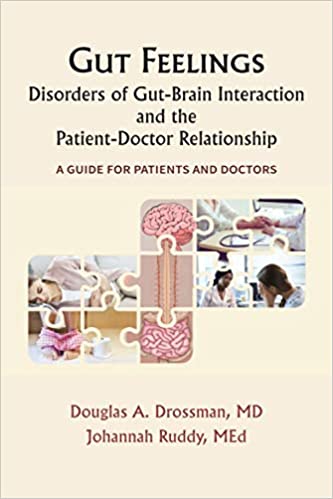Gut Feelings: Disorders of Gut-Brain Interaction and the Patient-Doctor Relationship
What's It About?
The good physician treats the disease; the great physician treats the patient who has the disease. —Sir William OslerSeveral months ago I had the opportunity to read and review Gut Feelings: Disorders of Gut-Brain Interaction and the Patient-Doctor Relationship. In the book, Dr. Douglas A. Drossman, MD, a renowned gastroenterologist, founder and COO of the internationally recognized nonprofit the Rome Foundation, and president of DrossmanCare, teams up with Johannah Ruddy, M.ED, the Executive Director of the Rome Foundation, patient advocate and patient herself, to educate both physicians and patients about a cluster of gastrointestinal medical conditions called Disorders of Gut-Brain Interaction (DGBIs).
Hope is something that is very difficult to come by when you are plagued with a chronic illness for which no test results seem to confirm a diagnosis, and DGBIs fall into this category. Patients with DGBIs are frequently misdiagnosed or what’s worse, dismissed entirely by doctors. That’s why Gut Feelings was literally a life-changing experience for me. Like millions of Americans, for many years I have been suffering from what turned out to be a DGBI. The book put me on a path toward managing my illness, beginning with finding a gastroenterology specialist near my home who had trained with Dr. Drossman.
A BOOK THAT CENTERS THE PATIENT
 So when I was offered the opportunity to read Drossman and Ruddy’s follow-up, Gut Feelings: The Patient’s Story — Personal Accounts of the Illness Journey, I jumped at the chance. This new book builds upon our understanding of DGBIs, how these disorders affect real people, and what doctors can do to truly help these patients. And it all begins with educated patients and empathetic doctors who are willing to become partners in care.
So when I was offered the opportunity to read Drossman and Ruddy’s follow-up, Gut Feelings: The Patient’s Story — Personal Accounts of the Illness Journey, I jumped at the chance. This new book builds upon our understanding of DGBIs, how these disorders affect real people, and what doctors can do to truly help these patients. And it all begins with educated patients and empathetic doctors who are willing to become partners in care.
In the Introduction, the authors write, “The patient-provider relationship is a collaboration in which both parties work together to achieve certain goals. The provider must understand the patient’s illness experience and see their world to diagnose and implement treatment properly. In turn, the patient must relate the illness experience in a meaningful and coherent manner to the provider and then participate in the diagnostic and treatment decision-making. This is called patient-centered care.”
LEARN THE SCIENCE BEHIND THE SYMPTOMS
While this is a theme that runs through both books, Gut Feelings: The Patient’s Story focuses on the powerful personal stories of eight DGBI patients, including the co-author, Johannah Ruddy. The authors say that the “primary aim of this new book is to bring patient experiences, told in their voices, to our readership in a way that will provide lessons for patients and providers for use in their clinical care … Most of the stories are notable for the extensive and frustrating processes these patients endured, despite their providers’ well-intentioned, but unsuccessful efforts.”
This is the unfortunate experience of many DGBI sufferers. One of the things that becomes abundantly clear is just how hidden DGBIs can be. In looking at the pictures of the patients, you would never guess what they have gone through and how they have suffered. DGBIs are truly invisible diseases, and the fact that they cannot be diagnosed with a simple test leads many providers to merely manage the symptoms, or even attribute these symptoms to being “all in your head.”
YOU DON’T HAVE TO STRUGGLE ALONE
Lesley, one of the patients who tells her story, says that she will never forget her relief over three little words Dr. Drossman said when she finally ended up in his examining room: “I believe you.” She said that just knowing he heard what she said and acknowledged that she was in pain gave her hope. “My greatest lesson,” she says, “was learning I was not alone, that people were willing to help, and others had been where I was and came out the other side. And this is when my life began to take a different path.” Her story really had an impact on me, as I too continue to struggle on my own difficult journey.
While each of the eight patient stories in this book is unique and their illnesses vary in both severity and effects on their quality of life, there are also very similar themes in their experiences. Several of them brought me to tears. Often I found myself nodding and saying, “yes, I know exactly what they are going through!” Along with the stories, I was fascinated by Dr. Drossman’s notes and Ms. Ruddy’s analysis of each case.
A HOPEFUL SEQUEL
As in the first book, the second one is filled with support, including links to videos and other helpful resources and even cartoons — because laughter is always healing. If you or someone you love is struggling with undiagnosed gastrointestinal issues, then you really must read both books and pass them along to anyone who might be able to find answers in their pages. Check out the resources the authors provide and start on your own journey from suffering toward healing. I now know that, after all these years, solutions actually do exist, I am not alone, and that there is, indeed, hope.
Gut Feelings: The Patient’s Story — Personal Accounts of the Illness Journey is available for purchase.





